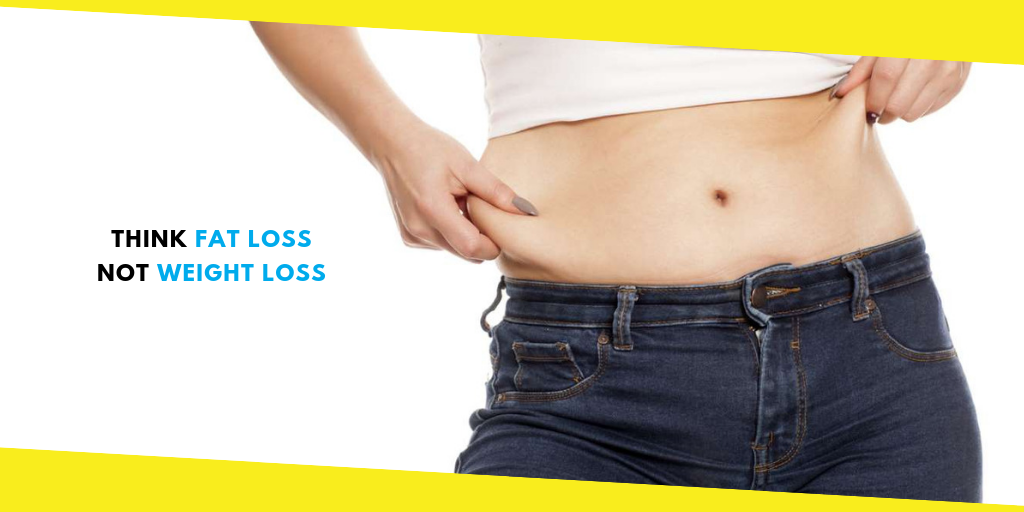Think Fat Loss Not Weight Loss
This post was last updated on April 16th, 2020

Weight loss is among the hottest subjects ever. Everybody appears to be looking to lose weight these days. A majority of diet programs are all focused on weight loss, and frequently body weight is used as the primary indicator for the dieter’s fitness progress. However, that is the wrong approach to take.
Your ultimate goal always should be losing fat and what you should be most concerned about is reducing your excess body fat. Fat loss and weight loss are not the same things! So many individuals confuse these two terms and mistakenly believe they are the same thing, when in fact fat loss and weight loss are entirely different from each other. In this article, we will be helping you understand how fat loss is different from weight loss and how in almost every way that fat loss is much better than weight loss.
Contents
ToggleWhat Is Weight Loss?
It is an attempt to reduce your total body weight overall. It just refers to a small number on the scale.
All of the different parts of your body are included in your body weight, including water, blood, tissues, organs, bones, fat, muscles, etc. Whenever you lose weight, you end up losing a bit of water, muscle, and fat.
You do lose fat, but not very much and you lose some water and muscle along with it. The more you reduce your intake of calories, the more quickly you will lose weight, but you will also lose more muscle mass in the process.
Your muscle does matter. Losing muscle affects your overall appearance and health.
Whenever you lose weight too fast, your body is unable to maintain all of its muscle. Since muscle needs more calories to sustain itself, it results in your body starting to metabolize, so it is able to reserve income calories to survive. One of the body’s defense mechanisms is to protect its fat stores to help ensure your survival in the event of a future famine rather than using muscle or lean tissue to give it all of the calories that it needs in order to keep vital organs functioning, like your liver, kidneys, heart, and brain. If you get to the point where you don’t have a lot of muscle or fat, your body will begin metabolizing your organs so that your brain continues to function which can lead to kidney failure, liver, stroke, and heart attack.
As your body loses more muscle mass, the overall metabolic rate of your body continues to decrease. Your metabolic rate refers to the rate that your body burns calories at and is determined partly by how much muscle you have.
When you have more muscle, your metabolic rate is higher; and having less muscle means your metabolic rate will be lower and you will burn fewer calories. That is why it is so critical that your metabolic rate is protected and that you don’t lose too much muscle.
Losing muscle also can lead to losing tone under your skin so that you are left unshapely and soft without any contour or form. When you lose weight too fast, your skin also won’t have enough time to adjust. Muscle is also what provides you with strength, so losing it will mean your body is weak.
You become smaller in size with weight loss and turn into a small version of who you were, with saggy skin and a fragile frame.
Over the short term, weight loss works to make you smaller. However, it is temporary, and nearly everybody ends up regaining weight. That forces you to look for another diet to follow, And then another one, and so forth – since all of them fail eventually.
What Is Fat Loss?
It is the attempt to reduce your total amount of body fat – which refers to the percentage of your overall body weight that is made of fat.
The proper approach to fat loss is to eat intelligently and exercise smartly in ways that exclusively focus on fat loss and maintain muscle.
The muscle that your body has isn’t there forever. You can lose it if you don’t use it and feed. A good plan with the proper combination of cardiovascular and resistance training with sufficient progression along with the right nutrition plan for supporting it can help you do this. The burning process is boosted by exercise, but it doesn’t melt fat away all on its own. Your stored fuel reserves will not be touched if you eat too much and don’t create a deficit. However, you will lose it, if you cut your calories drastically and don’t properly feed your muscle or use your muscle through exercise. Fat loss is about achieving the proper balance. Well, there are certain options available that helps you to shed excess fat and improve your health. Experts depict that stick to healthy lifestyle and switching up to healthy diet can have powerful effects on fat burning. If you aim to shed excess body fat, then simply try this best body fat percentage calculator that helps you to calculate body fat% according to different methods!
Fat loss focuses on keeping your metabolic rate operating high and maintaining your muscle. You also will develop stronger joints and bones, tighter skin, and stronger connective tissue. Your body is transformed with fat loss.
Fat loss is a type of lifestyle approach where your body is given everything it needs without shocking it or depriving or threatening it with starvation. You will see slow and steady progress that is permanent.
It might sound strange but it is possible to become thinner without your weight actually changing. That occurs when you gain muscle while losing body fat. You are losing inches but your weight remains the same.
How does that occur?
Fat tissue is not dense and is very loose. It takes up lots of space inside your body. On the other hand, muscle doesn’t take up as much space and is denser. When fat is lost, space is freed up and you will notice inches of loss. If you follow a strength training program on a consistent basis, then gaining less muscle tissue balances the loss of fat out and your weight remains the same. Since less space is taken up by muscle than fat, you will lose inches and begin looking more shapely, lean, and toned.
Recommended For You
Gluten-Free Diet: Top 5 Foods You Need to Avoid
Most Inside
Most Inside offers high-quality recommendations and valuable updates to enhance all aspects of your life, providing premium guidance and enriching experiences.




